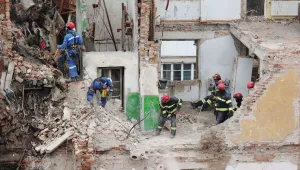On Friday July 23, the old Mostar bridge, which was bombed by Croat artillery in 1993, re-opened under a media spotlight and amid justified international satisfaction for yet another step forward in the long Bosnian post-war transition. The prevailing view among both tourists and Mostarians seems to be that the bridge “does not quite look the same as before the war.” But nothing in Bosnia looks quite the same as before. After almost a decade of massive international intervention, aimed at strengthening democratic institutions and addressing some of the worst human rights violations, Bosnia has not yet reached political, economic, and social stability. Various Bosnian political elites skillfully continue to play the ethnic card to maintain their control of different sectors of the economy and society. Internal divisions thwart Bosnia’s efforts toward EU membership.
An assertive international presence has attempted to remove obstacles to sustainable peace and democratization, often with little or no regard for the very international human rights norms that are deemed to motivate the international presence in the country. The paradox of this presence over the past decade is exemplified by the idea that democracy and human rights can be imposed through undemocratic means. The High Representative, Paddy Ashdown, makes decisions without being accountable for them. Last summer a European think-tank issued a report claiming that Ashdown rules Bosnia as the British ruled India in the 19th century, creating in effect a “European Raj.”
A European Raj
This claim has more than a kernel of truth in it. On June 30, Ashdown dismissed 60 democratically elected Bosnian politicians for their obstruction of the peace process. Fifty-nine of them were Bosnian Serb politicians allegedly involved in the criminal network of silence and complicity that keeps war-time leader Radovan Karadzic safe from arrest and transfer to the International Criminal Tribunal for the former Yugoslavia in The Hague.
By international standards of democracy, the dismissals are problematic. The politicians were democratically chosen though “free and fair” elections, while those who fired them are appointed bureaucrats free of the constraints of direct accountability to the Bosnian population. Even more troubling, there is neither a mechanism to appeal the decision, nor is any criminal prosecution anticipated for those politicians allegedly involved in the mismanagement and embezzlement of public funds. (Prosecutions based on allegations of criminal activity made by international officials do occasionally occur, but they remain the exception, not the rule.) The net impact of the dismissal, therefore, has done nothing to strengthen the accountability of politicians in Bosnia’s tutelary democracy.
These mass dismissals actually arise from the Bosnian Serbs’ lack of cooperation with international officials, in particular the requirements that Bosnia is expected to fulfil in order to enter NATO’s Partnership for Peace, which is the first step toward full NATO membership.
One of the conditions for Bosnia’s admission to that program was “defense reform.” International officials praised Bosnia for successfully reforming its military and creating a single joint command for its ethnically separate armies. Later, this condition was changed to cooperation with the International Tribunal. But “cooperation” is a vague term. Does it mean that Serbian authorities in Bosnia were expected to arrest Karadzic, a task at which NATO troops failed multiple times? Or were they supposed to simply demonstrate genuine effort at doing so? If the latter, how can such an effort be evaluated? It is beyond question that Bosnian Serb politicians made little effort to apprehend indicted war criminals. But the changing international demands make many Serb citizens feel that they are the target of international wrath, carried out by unelected and unaccountable international officials.
Undermining Democracy
Many human rights advocates have criticized these and similar decisions, which seem to neglect democratic principles and procedures. For example Doris Pack, a member of the European Union Parliament and Chairman of the Delegation for Relations with the countries of Southeast Europe, has vociferously attacked the arbitrary powers of the High Representative. But she is not the only one. Just a week prior to the mass dismissal, the Council of Europe issued a report that described the powers of the High Representative in these terms: “such powers run counter to the basic principles of democracy and are reminiscent of a totalitarian regime. Their use, no matter how seemingly justifiable on public-interest grounds, has an extremely harmful effect on the democratisation process in Bosnia and Herzegovina, since it causes feelings of injustice and undermines the credibility of democratic institutions and mechanisms.”
Perhaps more importantly, Bosnian citizens themselves do not always agree with the way these powers are used. In Han Pijesak, a hard-line municipality in the Eastern part of the Serb Republic of Bosnia, some 600 people signed a petition to reinstate the Serb mayor fired by Ashdown. This initiative is worth international attention for two reasons. First, Han Pijesak has a complicated labyrinth of underground tunnels and caves where Karadzic is said to occasionally hide. Second, the petition was also signed by many Muslim returnees who perceive the Serb mayor as a respectable and trustworthy person (at least as compared to the alternatives).
On the other hand, advocates of an assertive international presence justify any short-term costs (including the possibility of mistakes such as the one perhaps committed in Han Pijesak) as justified by potential long-term gains. Besides, the international administration is supported by a majority of Bosnians who are well aware that their political class is made up of crooks who often enriched themselves at the cost of widespread poverty. Perhaps not surprisingly, nobody took to the streets to protest Ashdown’s dismissal of 60 politicians. Instead, when the government of the Serb Republic threatened to dismiss Muslim ministers and engineer a government crisis, it quickly gave up its plans, probably in consideration of the possibility of an even bigger political loss of credibility by maintaining a hard-line stance.
The central question is whether this particular form of undemocratic, neocolonial rule of Bosnia can work in the long run. So far it has, at least on balance. Because of the work of international bureaucrats, the human rights situation has much improved compared to the one found at the end of the 1992–95 war. No immediate security threats challenge Bosnia and its citizens. Thousands of refugees and displaced persons were able to return home in conditions of (relative) dignity. Mosques are being rebuilt in the Serb Republic. Many indicted war criminals face prosecution in The Hague, and many more might soon find themselves in Bosnian courts, a clear sign of the legitimacy and efficiency of the Bosnian judicial system.
Some of these positive results were achieved by means that would be unacceptable in most western democracies. The problem of property rights is a case in point. During the war, massive population shifts created a situation whereby more than half of all Bosnian citizens lived in someone else’s house. Ad hoc “abandoned property” laws promulgated by the three main ethnic groups ratified this situation, making it practically impossible for the displaced population to re-take possession of their property and return to the place/s from which they had been expelled.
The High Representative twice imposed crucial amendments to property laws, in 1999 and 2001. The amendments created some legal certainty that proved indispensable to permitting the restitution of houses and apartments to their owners. Thanks to the implementation of these laws, more than 200,000 habitable properties were returned to their pre-war owners, an unprecedented accomplishment in post-conflict settlements.
In the process, however, it is certain that some abuses or mistakes were committed. On paper there was an appeals process to challenge particular claims for restitution, but that process was not allowed to stop evictions, therefore making it impossible for temporary occupants to have their appeals considered before they had to vacate the property where they may have illegally resided. On the other hand, limiting the appeals process prevented the possibility that property repossession could be deadlocked for years.
Thus, in the context of post-war societies that are deeply divided internally and have weak and ineffective state institutions, a maximalist position on procedural democracy can be self-defeating. This reality remains uncomfortable for some human rights advocates condemning the undemocratic rule of the High Representative.
But the problem is broader than the arbitrary powers of the High Representative. Which legal (and political) standards should apply in societies recovering from war? The Dayton peace agreement envisaged the direct application in Bosnia of some 20 human rights treaties, making the citizens of this country the most protected individuals worldwide, at least on paper. In practice, however, these treaties have been neglected, and the High Representative was left with considerable discretionary power in determining when and how to remove obstacles to democracy and human rights’ implementation.
Next Steps: Moving Beyond Neocolonial Rule
Almost a decade after the end of the Bosnian war, three steps seem urgent if the neocolonial process of ruling Bosnia is to actually enable the emergence of self-sustaining democratic institutions.
First, the power of the High Representative to remove elected politicians should be revoked, and Paddy Ashdown should be the last one. This power risks becoming a liability that actually prevents further democratization by removing the symptoms of a weak and corrupt political system, instead of addressing the causes that perpetuate this system. Criminal networks, cronyism, and widespread poverty cannot be addressed by occasionally removing some politicians from office. Prosecution of criminals, economic development, and a simplification of Bosnia's complex institutional system is a much more promising approach.
Second, and consequently, Bosnia’s elected government should be given full sovereignty. The alternative, technocratic rule by international civil servants, is creating popular disillusion and alienation from politics.
Third, in the absence of internationally recognized human rights standards applying specifically to post-war societies, and with the continuing presence of international powers able to arbitrarily impose significant changes on Bosnian political and economic life, the High Representative should act in such a way as to minimize such arbitrariness rather than reinforce it. One step in this direction would be for the High Representative to come up with a clear list of priorities and the means to achieve them, and then limit his actions to that agenda. When Ashdown became the fourth High Representative, he promised to focus his work on a small number of important areas, most notably reforming the judiciary and improving the competitiveness of the economy. The removal of 60 politicians is well beyond Ashdown’s self-imposed priorities. Seen from the outside, the removal might be seen as a necessary step to strengthen Bosnian democracy, but from within Bosnia, such arbitrary decisions weaken support for democratic institutions.
Like the old bridge in Mostar, Bosnia will not ever look quite like it did before the war, but it can certainly look much better. It is time to give Bosnians the chance to take responsibility for their future.
(Roberto Belloni is a Research Fellow at the Program on Intrastate Conflict and the International Security Program at Harvard University.)
Belloni, Roberto. “Bosnia: The Limits of Neocolonial Rule.” Foreign Policy in Focus, August 5, 2004
The full text of this publication is available via Foreign Policy in Focus.




